As a result of the increase in the number of attacks of the specimens of wild game species listed in the Annexes №. 1 and 2 of the Law №. 407/2006 on hunting and wild game protection, with subsequent amendments and completions, resulting in injury or death of an individual, given that wild game specimens are managed under the special law, the Romanian legislator was obliged to regulate liability for damages thus caused, responsibility that lies with the central public authorities responsible for hunting and/or the central public authorities responsible for the environment.
Our research addresses this form of liability as a novelty in the landscape of Romanian law, with all the range of effects it generates, in the sense of highlighting its special character in relation to the common law regulation of tortious liability of objective type, in terms of calculation of the material and moral component of the damage created as a result of the attack produced by a specimen of the wildlife species on a human, an attack capable of causing injury or even death of the victim.
We critically analyzed the text of Article 131 of Law №. 407/2006, with subsequent amendments and completions, considering, as a final conclusion of the study, that it is necessary to reform it as a matter of urgency, all the more so as there are serious doubts about the content of the regulation regarding the observance of the principle of constitutional rank of non-discrimination, as well as its concordance with the values of the ECHR, even in the context in which the state, as a subject of law, has been recognized the possibility of capping different types of compensation.





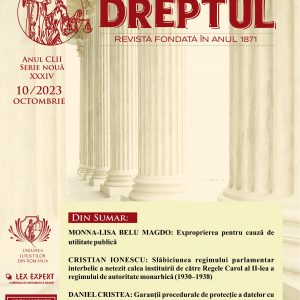


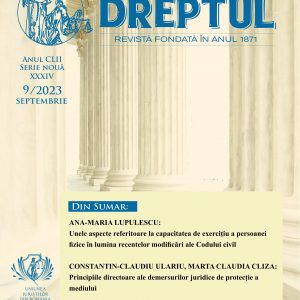



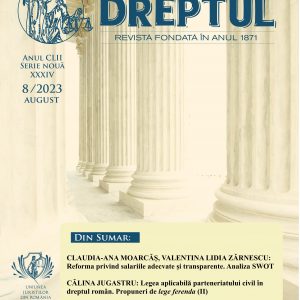

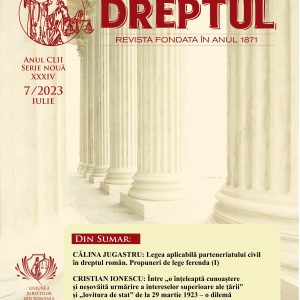






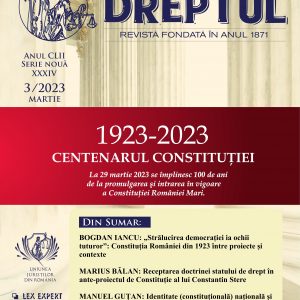

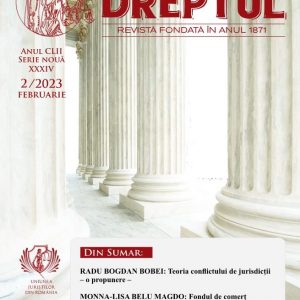










 This paper is the first part of a more extensive commentary on Article 5 of the European Convention on Human Rights, which will be entirely published in three consecutive issues of this law journal. The present work assesses the general features of the right to liberty and security as they emerge from the relevant case-law of the European Court on Human Rights. On this occasion, it underlines the purpose of this right, namely the protection of the individual from arbitrariness, and it analyses the general conditions for deprivation of liberty. It also goes on to evaluate the first two such situations of authorised deprivation of liberty enshrined in Article 5 § 1 a) and b) of the Convention.
This paper is the first part of a more extensive commentary on Article 5 of the European Convention on Human Rights, which will be entirely published in three consecutive issues of this law journal. The present work assesses the general features of the right to liberty and security as they emerge from the relevant case-law of the European Court on Human Rights. On this occasion, it underlines the purpose of this right, namely the protection of the individual from arbitrariness, and it analyses the general conditions for deprivation of liberty. It also goes on to evaluate the first two such situations of authorised deprivation of liberty enshrined in Article 5 § 1 a) and b) of the Convention. As a result of the increase in the number of attacks of the specimens of wild game species listed in the Annexes №. 1 and 2 of the Law №. 407/2006 on hunting and wild game protection, with subsequent amendments and completions, resulting in injury or death of an individual, given that wild game specimens are managed under the special law, the Romanian legislator was obliged to regulate liability for damages thus caused, responsibility that lies with the central public authorities responsible for hunting and/or the central public authorities responsible for the environment. Our research addresses this form of liability as a novelty in the landscape of Romanian law, with all the range of effects it generates, in the sense of highlighting its special character in relation to the common law regulation of tortious liability of objective type, in terms of calculation of the material and moral component of the damage created as a result of the attack produced by a specimen of the wildlife species on a human, an attack capable of causing injury or even death of the victim. We critically analyzed the text of Article 131 of Law №. 407/2006, with subsequent amendments and completions, considering, as a final conclusion of the study, that it is necessary to reform it as a matter of urgency, all the more so as there are serious doubts about the content of the regulation regarding the observance of the principle of constitutional rank of non-discrimination, as well as its concordance with the values of the ECHR, even in the context in which the state, as a subject of law, has been recognized the possibility of capping different types of compensation.
As a result of the increase in the number of attacks of the specimens of wild game species listed in the Annexes №. 1 and 2 of the Law №. 407/2006 on hunting and wild game protection, with subsequent amendments and completions, resulting in injury or death of an individual, given that wild game specimens are managed under the special law, the Romanian legislator was obliged to regulate liability for damages thus caused, responsibility that lies with the central public authorities responsible for hunting and/or the central public authorities responsible for the environment. Our research addresses this form of liability as a novelty in the landscape of Romanian law, with all the range of effects it generates, in the sense of highlighting its special character in relation to the common law regulation of tortious liability of objective type, in terms of calculation of the material and moral component of the damage created as a result of the attack produced by a specimen of the wildlife species on a human, an attack capable of causing injury or even death of the victim. We critically analyzed the text of Article 131 of Law №. 407/2006, with subsequent amendments and completions, considering, as a final conclusion of the study, that it is necessary to reform it as a matter of urgency, all the more so as there are serious doubts about the content of the regulation regarding the observance of the principle of constitutional rank of non-discrimination, as well as its concordance with the values of the ECHR, even in the context in which the state, as a subject of law, has been recognized the possibility of capping different types of compensation.